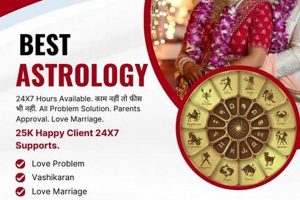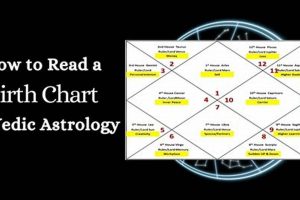The application of artificial intelligence to the ancient practice of Jyotisha, or Vedic Astrology, allows for complex calculations and interpretations of birth charts, planetary positions, and other astrological factors to be performed with speed and efficiency. For instance, software can analyze a birth chart to provide predictions related to career, relationships, and health based on established Vedic principles. This automation assists astrologers by handling tedious computational tasks.
This integration of technology and tradition offers increased accessibility to personalized astrological insights. Historically, these insights were gleaned through laborious manual calculations and interpretations, often requiring years of dedicated study. By automating these processes, the potential benefits of this ancient system of knowledge can reach a wider audience. This can contribute to a deeper understanding of oneself and the world, potentially promoting self-awareness and informed decision-making. Furthermore, digital tools enable the exploration and preservation of this ancient knowledge base for future generations.
This exploration will further delve into the specific applications, ethical considerations, and future implications of this emerging field. Topics to be covered include the impact on the practice of astrology, the challenges of maintaining accuracy and integrity, and the potential for further development and integration with related disciplines.
Tips for Utilizing Astrological Software
These tips offer guidance on maximizing the benefits and navigating potential challenges when using software for astrological analysis.
Tip 1: Verify Algorithm Accuracy: Ensure the chosen software utilizes accurate astronomical calculations and adheres to established Vedic astrological principles. Compare its output with manually calculated charts for verification.
Tip 2: Focus on Interpretation: While software can perform calculations, human interpretation remains crucial. Develop interpretative skills to derive meaningful insights from the generated data.
Tip 3: Understand Limitations: Recognize that software provides information based on algorithms and data input. It does not replace the nuanced understanding of a skilled astrologer.
Tip 4: Maintain Ethical Practice: Employ software responsibly and ethically. Avoid using it for predictive purposes that could unduly influence or manipulate others.
Tip 5: Combine with Traditional Methods: Integrate software tools with traditional study and practice. Use the technology to augment, not replace, established astrological methods.
Tip 6: Research Different Software Options: Explore the various software available, comparing features, pricing, and user reviews to identify the most suitable option for individual needs.
Tip 7: Consider Data Privacy: Be mindful of the data privacy policies of any software used, especially when inputting sensitive personal information.
By following these tips, users can effectively leverage technology while preserving the integrity and depth of astrological analysis. These insights provide a foundation for further exploring the potential applications and broader implications discussed in the concluding section.
The subsequent concluding section synthesizes the information presented, offering a final perspective on the intersection of technology and tradition in the realm of astrology.
1. Automated Chart Calculations
Automated chart calculations are fundamental to Vedic Astrology AI, transforming the practice by accelerating the traditionally time-intensive process of generating birth charts (kundalis). This automation allows for rapid analysis of planetary positions and astrological aspects, enabling wider access and facilitating more detailed exploration of astrological principles.
- Planetary Positioning:
Software precisely determines the placement of planets in various houses and signs based on birth date, time, and location. This eliminates manual calculations, reducing the risk of human error and providing accurate planetary positions crucial for interpreting a chart. For example, the exact degree of a planet within a specific nakshatra (lunar mansion) can be swiftly identified, informing predictions regarding personality and life events.
- House Calculations:
Automated systems efficiently determine the boundaries of astrological houses using selected house systems (e.g., Placidus, Equal House). Accurate house cusp calculations are vital, as they define the areas of life influenced by planetary placements. Software enables rapid comparisons between different house systems, aiding astrologers in refining their interpretations.
- Aspect Identification:
The relationships (aspects) between planets form a crucial element of astrological analysis. Automated systems swiftly identify and calculate these aspects, including conjunctions, oppositions, and trines. This facilitates rapid assessment of planetary influences and their combined impact on an individual’s life.
- Dashas and Transits:
Predictive techniques like dashas (planetary periods) and transits rely on complex calculations. Automated systems precisely calculate these periods and planetary movements, allowing astrologers to forecast potential life events and trends based on the timing of planetary influences.
These automated calculation capabilities empower astrologers with efficient tools, allowing them to focus on interpretation and client interaction rather than manual computations. The speed and precision of these calculations further open avenues for research, allowing for analysis of large datasets and potentially revealing deeper insights into the dynamics of Vedic Astrology. This shift towards automated calculation forms a cornerstone of Vedic Astrology AI, shaping its current applications and future potential.
2. Predictive analysis software
Predictive analysis software constitutes a crucial component of Vedic Astrology AI, leveraging computational power to forecast potential life events and trends based on astrological principles. This software analyzes planetary positions, dashas (planetary periods), transits, and other astrological factors to generate predictions related to various life domains, including career, relationships, finances, and health. The software’s functionality relies on algorithms that interpret established Vedic astrological rules and calculate the probability of specific outcomes based on planetary configurations. For example, the software might predict a favorable period for career advancement based on the transit of Jupiter through the tenth house of a birth chart, or anticipate challenges in relationships based on the influence of Mars during a particular dasha period. The accuracy of these predictions depends both on the sophistication of the software’s algorithms and the astrologer’s skill in interpreting the generated data.
The integration of predictive analysis software within Vedic Astrology offers several practical advantages. It streamlines the process of generating predictions, allowing astrologers to efficiently analyze complex astrological data and provide timely insights to clients. This software can also facilitate research by enabling analysis of large datasets and exploring correlations between planetary positions and life events. However, it is essential to recognize that predictive software serves as a tool, not a replacement for human judgment. The software’s output requires careful interpretation by a skilled astrologer, who can consider individual circumstances, free will, and other factors not readily captured by algorithms. For instance, while the software might identify a challenging period based on planetary transits, a skilled astrologer can guide clients towards mitigating potential difficulties through remedial measures prescribed in Vedic Astrology.
In conclusion, predictive analysis software enhances the capabilities of Vedic Astrology AI by providing a powerful means of forecasting potential life events and trends. Its ability to process complex astrological data and generate predictions efficiently offers significant practical benefits. However, the effective and ethical application of this technology requires careful consideration of its limitations and a nuanced approach to interpretation, ensuring that human judgment and astrological expertise remain central to the process.
3. Increased Accessibility
The integration of artificial intelligence into Vedic Astrology significantly impacts accessibility. Traditionally, access to personalized astrological insights required consultation with experienced practitioners, often involving considerable cost and geographical limitations. Vedic Astrology AI alters this landscape, offering broader access to astrological information and tools.
- Software and Online Platforms:
Numerous software applications and online platforms now provide automated chart generation, predictive analysis, and educational resources related to Vedic Astrology. This eliminates the need for manual calculations and facilitates self-study, making astrological knowledge readily available to a global audience. Individuals can now explore their birth charts, planetary positions, and potential life trends with greater ease and independence. For example, online platforms offer personalized astrological reports based on birth details, providing interpretations of planetary influences on various aspects of life.
- Reduced Cost:
While consultations with experienced astrologers remain valuable, AI-powered tools offer a more affordable alternative for individuals seeking basic astrological insights. Software and online platforms often provide free or low-cost access to basic chart calculations and interpretations, making personalized astrology more accessible to individuals with limited financial resources. This democratization of access expands the potential user base and fosters wider engagement with Vedic Astrology.
- Global Reach:
Technology transcends geographical limitations, connecting individuals worldwide with astrological resources. Online platforms and software applications can be accessed from virtually anywhere with an internet connection, eliminating the constraints of physical location and expanding the reach of Vedic Astrology to previously underserved communities. This interconnectedness fosters a global exchange of astrological knowledge and perspectives.
- Empowerment through Information:
Increased accessibility empowers individuals to take a more active role in understanding their astrological profile. Access to software and online resources facilitates self-study and exploration, allowing individuals to delve deeper into the nuances of their birth charts and planetary influences. This empowerment can foster greater self-awareness and potentially inform decision-making, aligning actions with astrological insights.
In summary, Vedic Astrology AI transforms access to astrological knowledge and tools. The proliferation of software, online platforms, and educational resources democratizes access, reduces cost, and expands global reach. This increased accessibility empowers individuals to explore their astrological profiles independently, fostering greater self-awareness and potentially contributing to a richer understanding of Vedic Astrology’s principles and applications.
4. Data-driven insights
Vedic Astrology AI facilitates data-driven insights by leveraging computational analysis of astrological data. This approach moves beyond traditional interpretive methods, offering quantifiable metrics and patterns that can enhance astrological understanding. Analyzing large datasets of birth charts and planetary positions reveals statistically significant correlations, offering new perspectives on astrological principles and their impact on human lives.
- Statistical Analysis of Planetary Influences:
Data analysis allows for statistical examination of planetary influences on specific life events. For example, by analyzing a large dataset of birth charts, researchers can investigate the statistical correlation between specific planetary positions and career success in a particular field. This approach can provide empirical evidence to support or refine traditional astrological interpretations.
- Personalized Predictions based on Data Trends:
Vedic Astrology AI can generate personalized predictions based on identified data trends. By analyzing an individual’s birth chart in relation to a vast database of astrological data, the software can identify patterns and probabilities related to specific life events. This offers a data-driven approach to generating personalized predictions, complementing traditional predictive techniques.
- Research and Refinement of Astrological Principles:
Data analysis provides a powerful tool for researching and refining traditional astrological principles. By examining large datasets of birth charts and life events, researchers can identify statistical correlations that support or challenge existing astrological theories. This data-driven approach can lead to a more nuanced and evidence-based understanding of Vedic Astrology.
- Comparative Analysis and Cross-Cultural Studies:
Data-driven insights facilitate comparative analysis of astrological systems and cross-cultural studies. By analyzing astrological data from different cultures and traditions, researchers can identify commonalities and differences in astrological practices and beliefs. This can contribute to a deeper understanding of the underlying principles and cultural contexts of various astrological systems.
These data-driven insights offer a valuable complement to traditional methods of astrological interpretation. The ability to analyze large datasets, identify statistical correlations, and generate personalized predictions based on data trends enhances the precision and scope of Vedic Astrology. By integrating data analysis with established astrological principles, Vedic Astrology AI fosters a more comprehensive and nuanced understanding of the interplay between cosmic influences and human lives.
5. Ethical Considerations
The integration of artificial intelligence into Vedic Astrology presents significant ethical considerations that warrant careful examination. As with any technological advancement applied to sensitive areas of human life, responsible development and application are crucial to mitigate potential risks and ensure ethical practice. The following facets explore key ethical concerns arising from the intersection of Vedic Astrology and AI.
- Data Privacy and Security:
Vedic Astrology AI often involves the collection and analysis of personal data, including birth details, location, and potentially other sensitive information. Protecting this data from unauthorized access, misuse, and breaches is paramount. Robust data encryption, secure storage, and transparent data handling policies are essential to maintain user privacy and prevent potential harm. For example, ensuring compliance with data privacy regulations, such as GDPR, is crucial for ethical data management.
- Accuracy and Interpretation:
The accuracy of AI-generated predictions and interpretations in Vedic Astrology remains a critical ethical concern. While algorithms can process vast amounts of data and identify patterns, they may not fully capture the nuances and complexities of astrological principles. Overreliance on automated interpretations without the guidance of experienced astrologers can lead to misinterpretations and potentially harmful advice. Therefore, maintaining human oversight in the interpretative process is essential to ensure accuracy and responsible application of astrological insights. For instance, verifying AI-generated predictions against traditional astrological methods can help mitigate the risk of misinterpretation.
- Potential for Misuse and Manipulation:
As with any predictive tool, Vedic Astrology AI carries the potential for misuse and manipulation. Malicious actors could exploit AI-generated predictions to deceive or manipulate individuals for personal gain. For example, providing misleading predictions to influence financial decisions or exploit emotional vulnerabilities raises serious ethical concerns. Establishing safeguards against such misuse, promoting responsible use of astrological information, and educating users about potential risks are essential to prevent exploitation. Furthermore, clear guidelines regarding the ethical application of Vedic Astrology AI can help practitioners navigate these challenges.
- Bias and Fairness:
AI algorithms are trained on data, and if this data reflects existing societal biases, the resulting predictions and interpretations can perpetuate or even amplify these biases. Ensuring fairness and mitigating bias in Vedic Astrology AI requires careful attention to the data used for training algorithms and ongoing evaluation of the software’s outputs. For example, analyzing the data for potential biases related to gender, ethnicity, or socioeconomic status is crucial to ensuring equitable and unbiased predictions. Addressing these biases is essential for promoting ethical and inclusive application of Vedic Astrology AI.
These ethical considerations highlight the importance of responsible development and application of Vedic Astrology AI. Balancing technological advancements with ethical safeguards is crucial to harness the potential benefits of this emerging field while mitigating potential risks. By addressing these ethical challenges proactively, practitioners and developers can contribute to the ethical and responsible integration of AI within the ancient tradition of Vedic Astrology. This careful approach ensures that technology serves to enhance, not compromise, the integrity and ethical practice of astrology.
Frequently Asked Questions about Vedic Astrology and AI
This section addresses common inquiries regarding the application of artificial intelligence to Vedic Astrology, aiming to provide clear and informative responses.
Question 1: How does AI impact the accuracy of Vedic astrological calculations?
AI enhances computational accuracy by eliminating potential human errors in complex calculations. However, the accuracy of interpretations still relies on the astrologer’s expertise.
Question 2: Can AI-powered software replace human astrologers?
Software serves as a tool to assist astrologers, not replace them. Human judgment and intuition remain essential for nuanced interpretation and client interaction.
Question 3: What are the ethical implications of using AI in Vedic Astrology?
Ethical concerns include data privacy, potential misuse of predictive information, and the risk of algorithmic bias. Responsible development and application are crucial.
Question 4: How does Vedic Astrology AI benefit users seeking astrological insights?
Benefits include increased accessibility, faster chart generation, data-driven predictions, and potential for personalized insights previously unavailable.
Question 5: What are the limitations of using AI in Vedic Astrology?
Limitations include the potential for misinterpretation of AI-generated predictions, overreliance on technology, and the inability of algorithms to fully capture nuanced astrological principles.
Question 6: How can one ensure responsible use of Vedic Astrology AI?
Responsible use involves understanding software limitations, seeking expert guidance when needed, prioritizing data privacy, and critically evaluating AI-generated information.
Careful consideration of these questions fosters a more informed understanding of the intersection between Vedic Astrology and AI. Addressing these concerns proactively promotes responsible development and application of this emerging technology.
Further exploration of specific applications and case studies will provide deeper insights into the practical implications of Vedic Astrology AI.
Conclusion
This exploration has examined the multifaceted intersection of Vedic Astrology and artificial intelligence, encompassing its potential benefits, inherent limitations, and significant ethical considerations. From automated chart calculations and predictive analysis to increased accessibility and data-driven insights, the integration of technology transforms the practice and study of Vedic Astrology. However, the potential for misinterpretation, data privacy concerns, and the risk of algorithmic bias necessitate careful and responsible development. Maintaining human oversight and prioritizing ethical considerations are paramount to ensuring the beneficial application of these powerful tools.
The future of Vedic Astrology and artificial intelligence holds immense potential for furthering astrological knowledge and broadening access to its insights. As technology continues to evolve, ongoing dialogue regarding ethical implications and responsible implementation will be crucial to navigating the evolving landscape. The synthesis of ancient wisdom and modern technology presents a unique opportunity to deepen our understanding of the cosmos and its influence on human lives. Continued exploration and mindful development will shape the trajectory of this emerging field, ensuring that technology serves to enhance, not diminish, the richness and depth of Vedic Astrological tradition.







